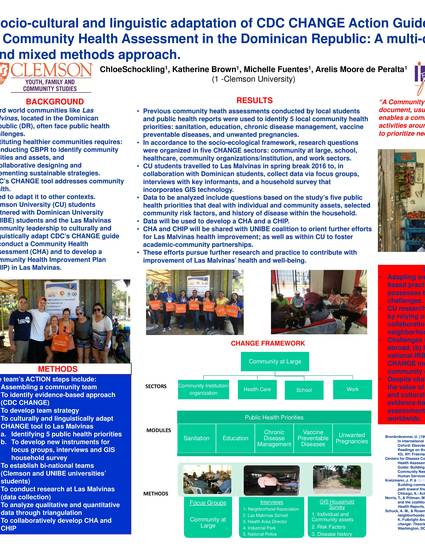
Background. Third world communities like Las Malvinas, located in the Dominican Republic (DR), often face public health challenges. Instituting healthy communities requires collaborative public health services. The US has used evidence-based initiatives including the CDC’s CHANGE tool to address community health. There is a need to adapt these initiatives to other contexts. Clemson University (CU) students have partnered with Dominican University (UNIBE) and the Las Malvinas community to improve the community’s health and well-being.
Methods. The team’s ACTION steps include: assembling a community team and strategy, reviewing the CHANGE sectors, and gathering the data to use in the CHANGE tool. The Community Health Improvement Plan (CHIP) will be developed from that data. After reviewing reports on Las Malvinas and site visits alongside public health theory, students modified CHANGE data tools both culturally and linguistically.
Results. Five public health priorities for Las Malvinas were identified: sanitation, education, unwanted pregnancies, vaccine-preventable diseases, and chronic diseases. CU students will travel to Las Malvinas and collect data via focus groups, interviews, and GIS household survey, created by CU students.
Discussion. Adapting and translating evidence-based practices across cultures poses opportunities and challenges. CU research team designed this project by relying on expertise and collaboration with a local university and neighborhood organization. Challenges included: (a) working from abroad, (b) language barriers, (c) binational IRB approval, (d) adapting CHANGE tool, and (e) limited community organizations. Despite these challenges, this project showed the value of cross-cultural collaboration and use of public health assessment tools to reach communities worldwide.
 This work is licensed under a Creative Commons Attribution-Noncommercial-Share Alike 3.0 License.
This work is licensed under a Creative Commons Attribution-Noncommercial-Share Alike 3.0 License.
Available at: http://works.bepress.com/arelismoore/16/
